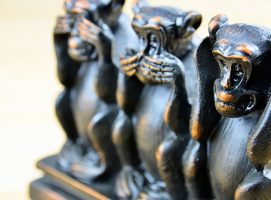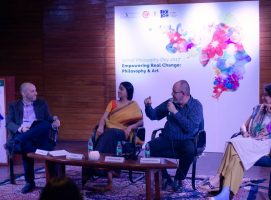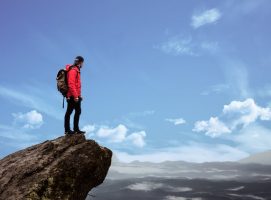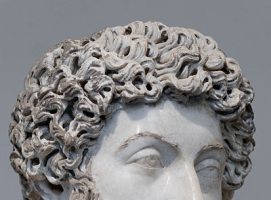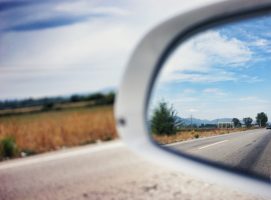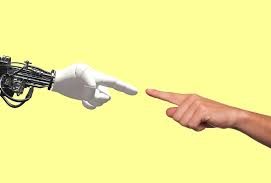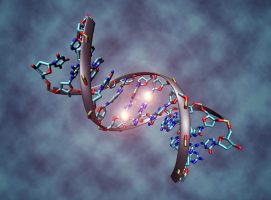Showing 125 articles
Life Lessons from the Amazon
Author: Trishya ScrewvalaApril 2, 2018
“Look deep into nature and then you will understand everything better.” – Albert Einstein The brief time that I recently spent in Peru’s southern Amazon Forest, really opened my heart to the beauty and infinite wisdom that nature has to offer. The potent combination of heat and humidity makes the Amazon the largest rainforest on [...]Improvisation in Art and Life
Author: Natalia LemaMarch 8, 2018
According to Stephen Nachmanovitch, an American improvisational violinist, improvisation can be used as a tool to aid creativity, which will lead us into a joyful journey. Bach and Mozart were great examples of this approach and were highly imaginative improvisers. The word ‘improvisation’ implies, on the one hand, an absence of preparation. But it also [...]A climate change we do urgently need!
Author: Sabine LeitnerMarch 8, 2018
Imagine what it must be like to go to work and to meet with constant abuse. To be surrounded by groups of 6 or 12 people as soon as you leave your home, who would scream at you, physically intimidate you and spit at you. To be called a “Jewish pig” or a “nigger” to [...]Empowering Real Change: Philosophy & Art Panel Discussion on World Philosophy Day 2017
Author: Compiled by Harianto H MehtaJanuary 21, 2018
For New Acropolis members across the globe, every day in a way, is World Philosophy Day. Through history, classical traditions have employed philosophy as the central axis of education, recognizing the pivotal role of wisdom and ethics, in the formation of human civilization. Therefore, we mark the special opportunity of UNESCO’s annual endorsement of World [...]The Barrenness of a Busy Life
Author: Tarini VaidyaJanuary 21, 2018
Last week I tried to catch up with a few friends for dinner, three to be precise. Can you believe we could not find a date when we were all free to meet until almost a month later! My friends work and I’m the only one who doesn’t work. Guess who was the busiest? Yes, [...]Scaling An Inner Summit
Author: Vishal PahlajaniJanuary 21, 2018
“Adopt the pace of nature: her secret is patience.” – Ralph Waldo Emerson Throughout the ages nature has time and again instilled a sense of awe and wonder within human beings; at her unparalleled beauty, at her mysterious methodology and her enigmatic laws that govern the universe. The ancient Greek philosophers, specifically the Pre-Socratic philosophers [...]A Stoic guide to our Emotions – Pt. 2: The sentiments of the sage
Author: Gilad SommerDecember 16, 2017
Despite the popular conception of the Stoics, in their writings, the ideal sage is not portrayed as a cold, apathetic person. By reflecting on the good and the bad, and on the true nature of things, the sage develops natural, rational sentiments – Hai Eupatheiai, literally, the good passions. These are: Wish, Caution and Joy. [...]A Stoic guide to our Emotions – Pt. 1: Can we trust our feelings?
Author: Gilad SommerDecember 16, 2017
Human beings are often said to be rational creatures, but in reality we are very much emotional creatures as well. More often than not, history is a showcase of tragic actions taken by human beings overcome by their passions. And apart from these grand-scale dramas, our everyday life is full of instances where the right [...]A Moment to Stop and Reflect
Author: Ilanit AdarOctober 19, 2017
This article is a compilation of excerpts from the book A Moment to Stop and Reflect by Ilanit Adar Matoki to be published in Korean. In times when knowledge is very accessible and there exists a flood of information, it is a challenge to acknowledge words of wisdom. The eyes quickly pass over unimportant words [...]Are We Human Beings or Human Doings?
Author: Archana SamarthOctober 19, 2017
This question is relevant to the times we live in. The pace of life accelerated by the need for constantly moving, rushing, or accomplishing emphasises the importance we associate with doing. Just being when the whole world seems to be caught up in a whirlwind of action, seems so passive! By doing, we feel we [...]The importance of knowing what is good
Author: Sabine LeitnerOctober 19, 2017
If morality is the discernment of what is good and consequently the ability to choose between what is good and what is bad, then we have clearly lost our moral compass some time ago. It seems that we don’t really know anymore what is good for us. And this starts at the most basic level [...]Epigenetics, The Science of Change
Author: Florimond KrinsAugust 16, 2017
Epigenetics is the science that studies the biological mechanisms that switch genes on and off, that make them active or inactive, without involving any changes in the DNA sequence. Having a gene switched on or off will change how the cells read the gene, read the information and how the cells produce proteins. To give [...]

